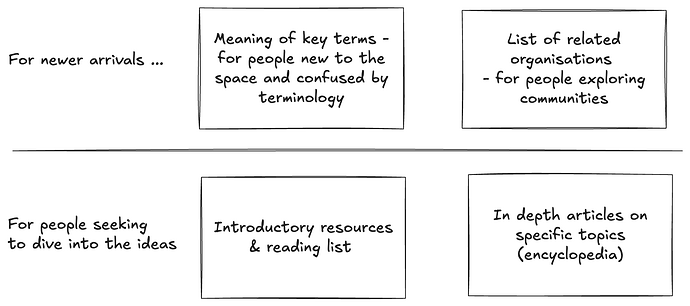This started from a prompt about the design for the Research / Knowledge Commons landing page. It evolved to the more general question of what are the main job stories for people coming to a second renaissance wanting “knowledge” i.e. what knowledge/sensemaking materials could we be creating.
One insight that came out of this was that rather than a single comprehensive “commons” there may be many mini-commons / projects.
NB: This material was generated during the Research Collective Collabothon / Hackathon ![]() 4th April 2025
4th April 2025
Summary
This was the summary/design we arrived at …
What kind of people come
- People who are drawn to what 2R is doing …
- People who want to contribute …
- People who want to learn more …
Brainstorm
From @JonahW
- Meaning of key terms - for people new to the space and confused by terminology
- List of related organisations - for people exploring communities
For people seeking to dive into the ideas
- Introductory resources: e.g. reading list
- In depth articles on specific topics (encyclopedia)
From @Naeema
Breakdown of the likely knowledge interests and a hierarchical structure based on probable audience types, their level of familiarity, and their needs:
1 New Explorers (First-time visitors / Curious readers)
Primary needs: Orientation, clarity, inspiration
Looking for: What is 2R? Core concept, values, vision?
Who’s involoved and why it matters? Practicle examples (projects, stories, outcomes)
Wiki Structure for them: Start here welcome | What is 2R? | Key Concepts (simple overviews) |
Ancestors of 2R (influences) | How to get involved? FAQ?
2 Sensemakers & Connectors (Researchers, generalists, systems thinkers)
Primary needs: Frameworks, patterns, contextual insight
Looking for: Ecosystem mapping, visual sensemaking tools, related movements / communities,
deep dive into cultural and civilization analysis
Wiki structure for them: Ecosystem maps & visual Frameworks, Related movements & Influence,
Key Questions, Glossary of Terms/ Lexicom of Emergent Language
3 Practitioners (Organizers, facilitators, artists, regenerative designers, etc.)
Primary needs: Methods, tools, community, application
Looking for: Practices that support 2R principles, Case studies / success stories,
How to host, organize, or contribute to gatherings
Wiki Structure: Practices, Events and gatherings, toolkits & Protocol,
organizing in the ecosystem, people (Collaborators & contributors)
4 Deep Divers / Co-creators (Committed contributors, thinkers, or developers of the 2R project)
Primary needs: Co-creation tools, theory-building, live questions
Looking for: Particvipatory research thread (forum), Living documents and shared questions,
governance, stewardship of 2R, editing and contributing to the wiki.
Wiki structure: Questions
From @rufuspollock
First some Process and Integration Thoughts:
- Many of these elements (directories, maps, primers) can and perhaps should begin on the forum, where contribution is easiest.
- Critical mass in any one area (e.g., orgs, people, concepts) may justify integration or expansion into a more structured, possibly merged system.
- While dictionaries, org directories, and people maps may eventually overlap, they should remain distinct until each reaches sufficient maturity [so that the offer to users and contributors is super clear]
Reference & Knowledge Projects
- Lexicon / Dictionary – A definitional resource for key terms and concepts in the Second Renaissance.
- Simple Introductions to Key Ideas – Short, accessible explainers on major concepts, for onboarding and clarity.
- Newsletter / News Stream – Regular updates with project news, events, and community highlights.
- Onboarding Guides for External Communities – Tailored pathways for people entering from effective altruism, climate activism, etc.
Directory & Mapping Projects
- Directory of Organizations and People – A structured, wiki-fied list of relevant organizations and people in the ecosystem.
- List-Slicing Functionality – Tools to group and browse orgs by theme (e.g., metamodern, integral, conferences).
- Subgroup & Link Discovery Tools – Methods to identify clusters and relationships within the broader network.
- Theories of Change Index – Entries that map and compare organizational theories of change.
- ecosystem.secondrenaissance.net – A dedicated domain for mapping organizations, networks, and projects.
- Extended Map of the Second Renaissance – A conceptual and relational map of the ecosystem as
a whole.- People’s Journey Mapping – Visuals or narratives showing how individuals enter and move within the ecosystem.
